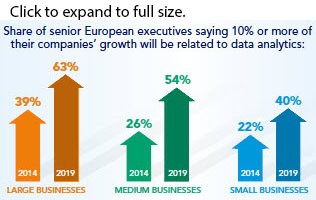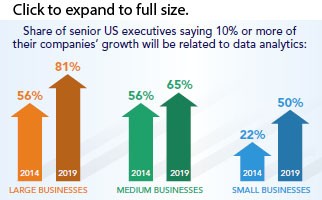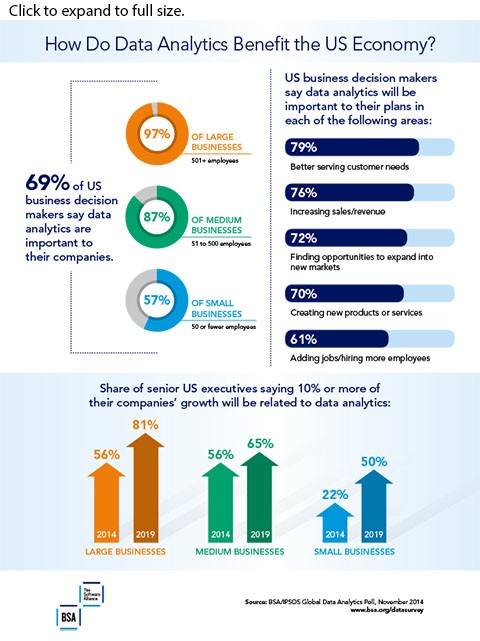There are pervasive myths and misconceptions about how data innovation is transforming the global economy, from the idea that it’s all about so-called “Big Data” (in fact, analyzing even small data sets can produce useful insights) to the false notion that all data is personal information (when discoveries are being made from data sources such as wind turbines, jet engines, financial markets, crop harvests, traffic patterns and energy consumption).
Today we released a new survey that sets right another such myth — that big tech companies and Silicon Valley start-ups are the main beneficiaries of data innovation. The reality is that data tools are catalysts for innovation and growth across the whole economy, and the benefits of that innovation and growth accrue to society as a whole.
We commissioned Ipsos Public Affairs to poll 1,500 senior executives and business decision-makes across the United States and Europe about the role of data analytics in their companies. We found a number of things that were surprising:
- First, data analytics are important to companies of all types and sizes — including an overwhelming majority (60 percent) of small businesses with 50 or fewer employees.
- Second, data analytics can contribute to job growth. Sixty-one percent of senior executives in the US and 58 percent in Europe say data analytics are important to their companies’ plans to hire more employees.
- Third, eight out of 10 respondents overall say data analytics are important to their companies’ plans to better serve their customers’ needs.
It’s clear that data innovation will be increasingly important to how companies across the economy do business. The question is: how do we ensure we are maximizing the opportunities?
 Data is inherently borderless, making the digital economy a global economy. That is why it is critical that we have global trade rules that promote data innovation. But currently there are no global standards in place to ensure that data can move freely across borders.
Data is inherently borderless, making the digital economy a global economy. That is why it is critical that we have global trade rules that promote data innovation. But currently there are no global standards in place to ensure that data can move freely across borders.
Chief negotiators from 12 countries are converging this week in Washington to continue hammering out the terms of the Trans-Pacific Partnership (TPP). That agreement — and the ongoing US-EU Transatlantic Trade and Investment Partnership (TTIP) — present important opportunities to establish 21st century trade standards that enable data to flow across borders. That’s why BSA is urging trade negotiators to seize the moment and create the beginnings of a global framework to promote open markets and prevent protectionist measures such as server-location requirements that could undermine the architecture of the Internet and stifle data innovation.
Equally important is the need to build public trust in the underpinnings of the digital economy. That trust has been shaken in the aftermath of the Snowden/NSA disclosures. We must strike the right balance between essential privacy protections and governments’ need to access data for legitimate national security and law enforcement purposes. These are difficult issues, but our survey shows that getting them right will have an enormous payoff.



